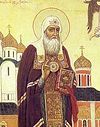

| Previous day | Next day |
| Old Style
May 12
|
Monday |
New Style
May 25
|
| 6th Week after Pascha. Tone 5. | No fast.
|
![]() St. Epiphanius, bishop of Cyprus (403).
St. Epiphanius, bishop of Cyprus (403). ![]() St. Germanus, patriarch of Constantinople (740).
St. Germanus, patriarch of Constantinople (740). ![]() Glorification of St. Hermogenes, patriarch of Moscow and all Russia (1913).
Glorification of St. Hermogenes, patriarch of Moscow and all Russia (1913).
St. Sabinus, archbishop of Cyprus (5th c.). St. Polybius of Cyprus, bishop of Rinokyr in Egypt (5th c.). New Martyr John of Wallachia, at Constantinople (1662). St. Dionysius of Radonezh (1633), and St. Anthony (Medvedev) (1877), archimandrites, of St. Sergius Lavra. Second translation of the relics of Righteous Symeon of Verkhoturye (1992). Synaxis of the Saints of the Sofroniev-Molchensk Monastery (Ukraine): Archimandrite Theodosius (Maslov), Hieromonk Serapion, Monk Sophronius (Batovrin), and Novice Sergius (Tikhonov), fool-for-Christ.
New Martyr Athanasia (Lepeshkin), abbess of the Smolensk Hodigitria Convent near Moscow (1931).
Martyr Pancratius of Rome (304). St. Philip of Agira, Sicily (5th c.). St. Theodore of Cythera, monk (922). New Martyr John of Serres (15th-16th c.).
Commemoration of Monk Dorotheus, disciple of St. Dionysius of St. Sergius Lavra (1622).
Thoughts for Each Day of the Year
According to the Daily Church Readings from the Word of God
By St. Theophan the Recluse

Monday. [Acts 17:1–15; John 11:47–57]
What do we? for this man doeth many miracles (John 11:47). Jewish erudition found the Saviour to be guilty. And in our days, German erudition[1] finds what is supernatural to be out of place in the Gospels of Christ: everything is good, only this [the miraculous] just won’t work. These two ways of thinking meet in the final analysis. Jewish erudition decided: it is expedient that one man should die (John 11:50), and that the rest might not perish, while German erudition states: we will eliminate the supernatural to preserve all the other Gospel truths. And what came of this? The Jews destroyed their people, while the Germans lost all Christian truths, and now are left with almost nothing. The Lord is the cornerstone of the house of salvation; similarly faith in the supernatural is the cornerstone of the entire building of God-inspired truth. The Saviour Himself, in His Person, is the crown of the supernatural, and its inexhaustible Source is in the Church. He who touches this point is touching the apple of God’s eye.
[1] By “German erudition” St. Theophan is most likely referring to the Protestant German philosophers of his time.
Articles
 St. Epiphanius the Bishop of CyprusSaint Epiphanius, Bishop of Cyprus, “a last relic of ancient piety,” as Saint Jerome calls him, lived during the fourth century in Phoenicia. |
 St. Sabinus the Archbishop of CyprusSaint Sabinus, Bishop of Cyprus, was born in the Phoenician city of Lycia. |
 St. Polybius the Bishop in CyprusSaint Polybius was a disciple of Saint Epiphanius of Cyprus. He accompanied him on all his journeys and he wrote about the life and miracles of his teacher. |
 Martyr John the Wallachian of RomaniaSaint John was born into a poor family in Oltenia during the time of Prince Matthew Basarab. |
 Righteous Simeon the Wonderworker of VerkhoturyeSaint Simeon of Verkhoturye was a nobleman, but he concealed his origin and led the life of a beggar. |
 Martyr PancratiusThe Holy Martyr Pancratius was a native of Phrygia, but lived in Rome with his uncle Dionysius after his parents died. They heard Bishop Cornelius preach, and were later baptized. |





